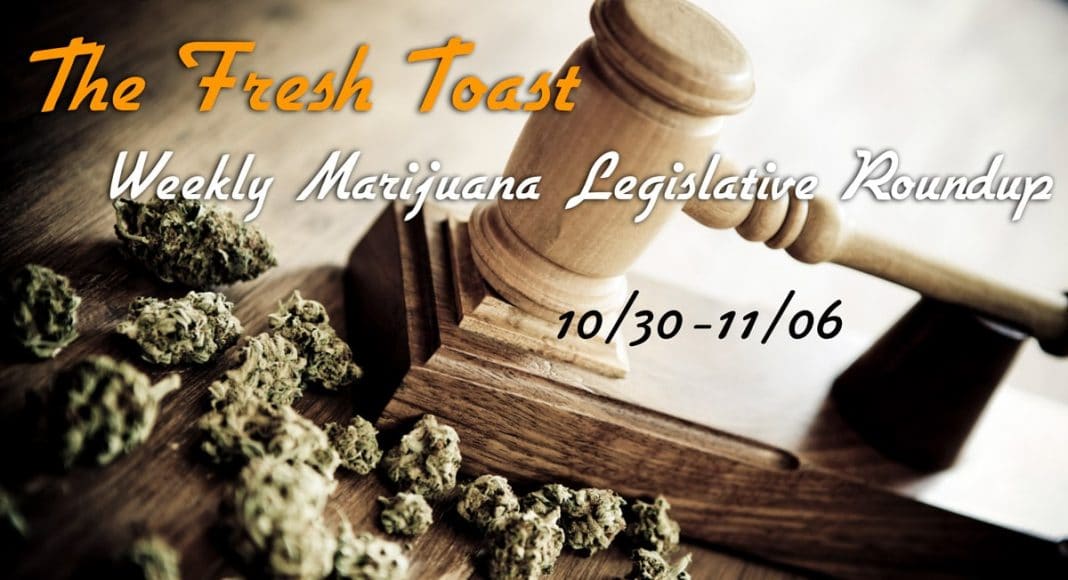The reform of marijuana laws took a few steps forward and one big step back last week. The biggest news of the week was in Maine, where Gov. Paul LePage vetoed legislation voters passed a year ago. Read all about these developments and more in The Fresh Toast’s Marijuana Legislative Roundup for Nov. 6.
Maine:
On Friday, Maine Governor Paul LePage vetoed legislation to implement the recreational marijuana legalization measure passed by voters in November 2016. The bill sought to increase the sales tax on marijuana from 10 percent to 20 percent, require municipalities to “opt in” to the state’s legal cannabis market, and make a number of changes to the way cannabis is regulated at the state level. The legislation was the result of months of work by a special committee tasked with creating a regulatory framework for recreational marijuana in Maine. LePage, an outspoken critic of cannabis legalization, expressed public safety concerns and uncertainty regarding federal policy toward marijuana legalization. This was apparently a reference to numerous statements made by Attorney General Jeff Sessions in opposition to state efforts at marijuana legalization.
-
Related Story: Maine Governor LePage Just Vetoed Legal Marijuana
Maine lawmakers will meet this week to discuss an override of the governor’s veto, which would require the vote of two-thirds of both legislative chambers. While the measure received a veto-proof majority in the Senate, it failed to garner two-thirds of votes in the House of Representatives. It has been legal to grow and possess cannabis in the state since last February, but the legislature has delayed the start of recreational sales until February of 2018. In October, LePage urged lawmakers to further delay recreational sales until 2019 to provide more time to finalize the regulatory framework.
Nevada:
On Wednesday, the Nevada Tax Commission voted unanimously to extend emergency regulations on marijuana sales. The emergency regulations restrict applications for cannabis distribution licenses to liquor wholesalers, following a Nevada Supreme Court ruling that granted liquor wholesalers the exclusive right to apply for such licenses. A unique provision of Nevada’s voter-approved legalization measure gives liquor wholesalers the exclusive right to transport marijuana from growers to retailers for the first 18 months of recreational sales.
-
Related Story: Jackpot! Nevada’s Legal Weed Retail Sales Hit $33 Million
In April, the Department of Taxation determined that wholesalers would be unable to meet demand for recreational cannabis and granted some distributor licenses to existing medical marijuana retailers in advance of the July 1 beginning of sales. Following a protracted legal battle that caused supply shortages and a steep decline in retail sales, the Supreme Court sided with the group of liquor wholesalers that brought the lawsuit. However, licenses granted on or before September 14 will remain valid for a year following the date of their issuance. A final set of regulations is awaiting approval by the Nevada legislature.
New Jersey:
On Tuesday, a New Jersey appeals court ruled that the state’s Division of Consumer Affairs must review marijuana’s Schedule I status. The ruling noted that there are clear medical uses of marijuana that were not known when the state adopted the federal government’s Schedule I classification in 1971. Schedule I drugs, which include heroin and LSD, are defined as having no “accepted medical use.” However, New Jersey has allowed marijuana to be consumed for medical purposes since 2010. The state intends to appeal the ruling to the Supreme Court.
Texas:
On Monday, county commissioners in El Paso, Texas unanimously approved a measure to decriminalize possession of small amounts of marijuana for first-time offenders. The First Chance program will waive criminal charges for people without prior marijuana convictions who are caught in possession of no more than two ounces of marijuana. Those also facing additional charges will not be eligible. The program is set to begin this month, and follows similar moves by Dallas and Harris counties, as well as the city of Dallas.


